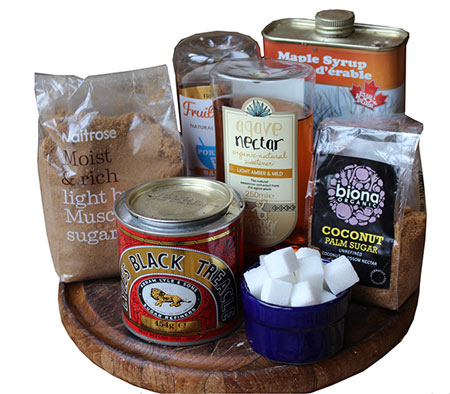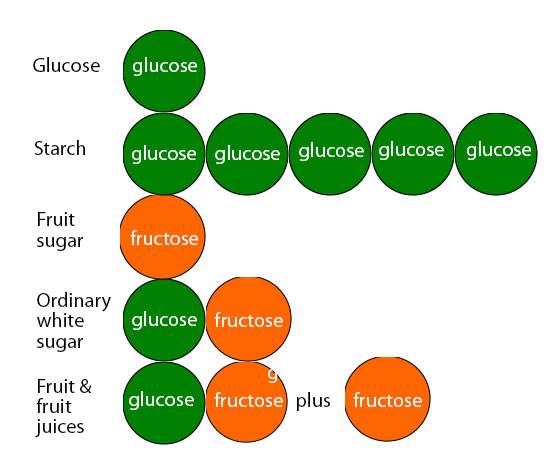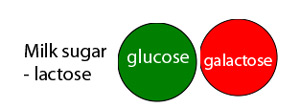|
|
Sugars matter – Margaret Moss explains how |
 There are two paperbacks I often recommend to my clients, as their message really matters. Both are on problems caused by fructose, or fruit sugar. Starch is chains of glucose, the sugar our bodies run on. Ordinary sugar is called sucrose, and half of it is fructose. The other half is glucose. Fruit contains fructose on its own, as well as more fructose in the sucrose. 
Which is the problem, sugar or fat? Decades ago, Professor John Yudkin and some others in Britain and America became concerned about the amount of sugar people were eating. They realised it was connected with heart disease, diabetes and obesity. Yudkin wrote a book about sugar caller Pure, White and Deadly, which was published in 1972. He did research showing that eating large amounts of sugar reduced HDL cholesterol, which protects the arteries, as it contains an antioxidant. Reducing fructose consumption cut harmful blood fats, called triglycerides. However, in America Ancel Keys insisted that fat was the problem and misused statistics to convince people that he was right. (See The Biology of Human Starvation.) Sadly many people still believe this. I don’t know if he was one of those people who are convinced they are right whatever the evidence, or whether there was some inducement from the sugar industry. Certainly what happened greatly benefitted the sugar industry. People increased their sugar consumption, to make dull low fat food palatable. A way was then found to turn maize into a cheap sweet liquid, high fructose corn syrup, and fructose consumption went up further. If you eat and drink already prepared food and drink, you can consume much more sugar than you would put in food you prepare yourself. You would be embarrassed to put as many spoons of sugar in a drink as the manufacturers have put in a fizzy drink. Fructose is worse than glucose Some Americans have realised that Yudkin was right. In 2008, Richard Johnson, with Timothy Gower, published The Sugar Fix. They discuss how fructose increases harmful fats called triglycerides in the blood, while glucose does not. They do not advocate the glycaemic index diet, as that is about reducing glucose, and not fructose. They explain that fructose attaches to protein. When sugars attach to protein, it is called glycation. This process forms advanced glycation end products, or AGES. These increase oxidation and inflammation, probably speeding up aging. Fructose increases the body’s production of uric acid. This acid is involved in gout, high blood pressure and kidney disease, and may be involved in dementia. People with non-alcoholic fatty liver disease tend to have high fructose consumption. Many people have digestive symptoms after eating too much sugar, because they cannot absorb so much fructose into the bloodstream. So it remains in the gut, feeding bacteria that produce hydrogen, making them feel bloated with gas. Many people with irritable bowel syndrome recover, on reducing their fructose intake. A few people are born with hereditary fructose intolerance, which is different. These people cannot process fructose, and may end up with liver disease, if they don’t avoid it. A high fructose diet causes insulin resistance, and communities with high fructose consumption have many type 2 diabetics. High fructose consumers are more likely to develop cancer. Women with high fructose intake are more likely to develop a dangerous condition in pregnancy called preeclampsia. Fructose appears to encourage cataracts more than glucose. Fructose does not reduce hunger, and so encourages people to keep eating and become obese. It makes people resistant to leptin, the hormone that should tell us we have had enough to eat. Recipes Galactose is bad too
Why obesity? In 2013 Professor Robert Lustig published Fat Chance. He says that reducing calories consumed and increasing exercise are not effective against obesity. If you eat too little, your body reduces its energy expenditure. Exercise is good, as it improves insulin sensitivity. People are blamed for obesity, but how can you blame an obese toddler? The toddler eats what the parents provide, and often what they provide is what the food industry has promoted. Hormones Eating glucose increases leptin, the satiety hormone, and reduces ghrelin, the hunger hormone. However, eating fructose doesn’t increase leptin or reduce ghrelin, and hunger continues. Eating fruit in autumn used to make people fat so they could survive the winter, when food was scarce. Diets that work Often the problem is not so much what is eaten, but what is drunk. Fizzy drinks and fruit juice are often the problem. Successful diets are very different. They may be just protein and fat, like the Atkins diet, or just vegetables and grains like the Ornish diet, or starch and protein like the traditional Japanese diet. What they have in common is that they restrict the amount of sugar eaten. What else fructose does Fructose appears to cause leaky gut, fatty liver disease, diabetes, cancer, dementia and aging. Real food or supplements As with Johnson’s book, Lustig’s is good on his own speciality, but superficial when it comes to a different topic, in this case nutritional supplements. Large scale research on supplements often uses harmfully high doses, or ineffective low doses, and often the quality of the supplements used is poor. Sometimes nutrients are used in the wrong combinations. Lustig relies on this poor quality research to state that supplements are a house of cards. I agree with him that real food is vital for good health, but supplements can be useful too, if good quality, and carefully chosen. There are many good quality research articles showing this. If you want to test a new train, you employ a train driver, not a bus driver or aeroplane pilot. If you want to test nutritional supplements, you need someone knowledgeable about nutrition, and not a doctor who only knows how to use drugs and who had only a few hours of nutrition in his training. What should governments do? Lustig goes on to call for action by governments. Sugar is addictive, like alcohol, and asking individuals to control their intake has limited effect.
None of these measures is easy, but treating fructose related diseases like cancer and dementia is extremely expensive, and health costs may force governments into taking action. Allergy and intolerance Neither of these books is directly about food sensitivity or food allergy. Johnson does mention that overconsumption of fructose means it cannot all be absorbed, causing digestive problems. Lustig is concerned about the lack of fibre in modern highly processed sugary diets. Sugar and milk sugar encourage the wrong microorganisms to live inside us. Fibre feeds good microorganisms, which make special fats to feed the cells of the gut, and prevent it from being too leaky. One of these fats is butyric acid, which reduces inflammation in the gut. A leaky gut encourages allergens to reach the bloodstream, causing allergic reactions. The western low fibre diet means that babies receive a less varied mixture of organisms than in the past, and each generation has less variety. The gut microorganisms control the immune system, increasing inflammation when there is an infection to fight, but decreasing inflammation when it is not needed. Retraining the palate The solution isn’t to look for alternatives to sugar, like aspartame and saccharine. The solution isn’t to avoid glucose and use honey, fruit juice or agave syrup, which all provide fructose. The solution is to retrain the brain not to expect lots of sweetness. You can then enjoy the other tastes in the food. Home cooking is best If you can’t eat certain foods, the best solution is to eat food prepared at home from basic ingredients. Lustig quotes Michael Pollan’s rule that, “If your grandmother wouldn’t recognise it as food, then it isn’t.” If you buy ready prepared free from foods, you need to check carefully what they contain. They may not contain wheat or milk, but if they have lots of sugar in them they won’t be healthy for anyone. You may not be allergic to sugars, or intolerant of them, and yet they may make your allergy or intolerance of other foods worse. When treating allergy or intolerance you have to do two things. One is to reduce or eliminate exposure to what triggers your reaction, whether eggs, milk or wheat, but the other is to make yourself less easily triggered by these foods. Restricting sugar is an important part of that. April 2016 If you found this article interesting we have a number of other articles on sugars and sweeteners here; for the broader topic of food allergy and intolerance check here. For alternative sweeteners see here; or check our recipe pages for low sugar recipes. |

 Like a lot of researchers, Johnson is good on his specialist topic, which is fructose, but not necessarily on other aspects of food. Unfortunately he then goes on to praise milk. Yet galactose, which is part of milk sugar, is a more avid glycator than fructose, which may well be why milk is the food most connected with heart disease. Hard cheese is much better for you, as it doesn’t contain more than a trace of sugar, and it does contain vitamin K2, which is good for both arteries and bones.
Like a lot of researchers, Johnson is good on his specialist topic, which is fructose, but not necessarily on other aspects of food. Unfortunately he then goes on to praise milk. Yet galactose, which is part of milk sugar, is a more avid glycator than fructose, which may well be why milk is the food most connected with heart disease. Hard cheese is much better for you, as it doesn’t contain more than a trace of sugar, and it does contain vitamin K2, which is good for both arteries and bones.










